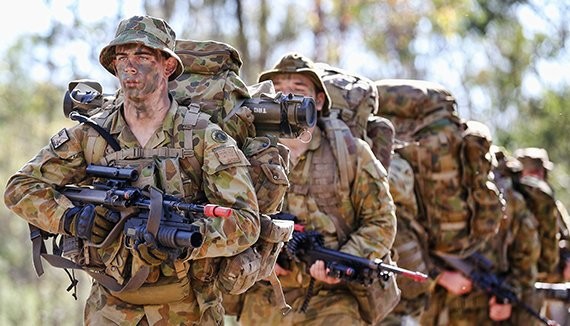ED: For those living in Brisbane and surrounds I have attended this event previously and I highly recommend it as a great day. Ray
The Commonwealth government has announced that nearly 300,000 Veteran Card holders can now add their cards to the myGov app. Starting today, Australian service personnel will be able to store a digital version of their Veteran cards in the myGov app wallet.
Previously, Centrelink concessions, Medicare, and other healthcare cards could be added to the myGov app. The addition of digital Veteran cards aims to improve access to services provided by the Department of Veterans’ Affairs (DVA). Any veteran with a MyService account can add their card to the myGov wallet, provided the two accounts are linked. MyService also allows users to submit and track claims, monitor accepted conditions, arrange transport, and apply for treatment.
Minister for Veterans’ Affairs Matt Keogh stated that the update “will put those supports right in the palm of your hand.” He encouraged health professionals and service providers to accept the digital cards where offered. Keogh emphasized the importance of improving MyService, highlighting the need for simpler, better, and more accessible online services as a priority for the DVA. MyService is now the primary point of access to DVA’s online services, allowing veterans, families, and representatives to conduct their DVA business online.
Minister for Government Services Bill Shorten noted that 1.2 million digital cards and certificates have already been added to the myGov app wallet. He described the wallet as a convenient option for securely storing important cards and documents, with built-in protections against fraud and theft, including holograms and QR codes to verify the authenticity and validity of the items displayed.
In the 2024 federal budget, the Commonwealth government allocated $630 million over four years and $145 million per year to grow and support myGov.
The Collins class is a fleet of six Australian submarines constructed by Tenix Defence during the 1990s and 2000s. These submarines are recognized as some of the most advanced and capable in the world, boasting cutting-edge features such as stealth technology, air-independent propulsion, sophisticated sensor arrays, long-range operational capabilities, and substantial payload capacities.
The Collins class submarines have demonstrated their prowess through significant achievements, including circumnavigating the globe without the need for refuelling and undertaking critical patrols in strategically vital areas such as the South China Sea. These feats underscore their operational versatility and endurance.
However, the Collins class has not been without its challenges. The submarines have encountered various technical issues and maintenance difficulties over the years, necessitating continuous upgrades to stay abreast of contemporary technological advancements. These challenges have required substantial effort and resources to address.
Despite these obstacles, the Collins class submarines remain a cornerstone of Australia’s national security strategy. Their advanced capabilities and proven performance continue to provide Australia with a potent and reliable underwater defence force, contributing significantly to the nation’s maritime security and defence posture.
ED: From my inbox with the comment “I suspect the same applies here.”
Affirmation of what’s going on all over the world and how uninformed these so-called “College Students” are. [As a parent, I would strongly worry about what kind of education my child is receiving] This is just a small sample of what these so-called institutions of higher learning are teaching and it’s absolutely pathetic and unconscionable of them. If this is the calibre of students they’re turning out, GOD HELP US ALL
Hyundai Rotem Media Release
Hyundai Rotem reported that another 18 K2 tanks were delivered to Poland’s port of Gdynia. This is part of an order of 180 tanks agreed upon with the Polish Armed Forces Agency in August 2022. So far, Poland has received 46 K2 tanks, including an initial delivery in 2022 and another 18 in 2023.
Hyundai Rotem has been praised for its rapid production and delivery, exceeding local expectations. To ensure top performance, the company conducts rigorous quality control, including weekly diagnostics and incorporating feedback from previous deliveries.
The K2 tank, designed and manufactured in South Korea, is noted for its superior firepower, precision, and advanced protection. It features a 120mm main gun, 7.62mm coaxial machine gun, 12.7mm heavy machine gun, advanced composite armour, and Explosive Reactive Armor (ERA). Weighing 55 tons, it can reach speeds up to 70 km/h and has a range of 450 km.
Technological features include an advanced fire-control system, active protection system, NBC protection, night and thermal vision, and an automatic fire suppression system. It also has a snorkel for limited amphibious operations. The K2 accommodates a crew of three and has dimensions of 10.7 meters in length, 3.6 meters in width, and 2.4 meters in height.
A Hyundai Rotem spokesperson stated their commitment to the success of the Polish K2 tank project, covering production to maintenance and fulfilling obligations to the Polish defence forces.
US Pacific Fleet Commander Admiral Stephen T. Koehler attended a discussion in Perth about the collaboration between the US, Australia, and other allies in the Indo-Pacific region. The US Pacific Fleet includes approximately 200 ships, 1,500 aircraft, and 150,000 personnel.
Admiral Koehler highlighted the development of the Submarine Rotational Force-West (SRF-West), a significant initiative of the AUKUS partnership, utilizing Perth’s strategic position. The US has regularly deployed submarines to Australia, including a visit from USS Annapolis in March. Australian sailors are training in the US Navy’s nuclear power program, with three Australian officers stationed on US Virginia Class submarines in Pearl Harbor.
Additionally, 30 skilled workers from ASC in South and Western Australia have been deployed to Pearl Harbor Naval Shipyard for training in maintaining US Virginia Class nuclear-powered submarines. This follows the Australian government’s selection of ASC as a strategic partner for sustaining and building nuclear-powered submarines in Australia.
Deputy Prime Minister Richard Marles emphasized the opportunities for Australians in education, training, and career development through the AUKUS program. More than 100 Australian shipyard workers are expected to receive naval propulsion training in the US by mid-2025. These workers will return to Western Australia to support the SRF-West, maintaining rotating US and UK nuclear-powered submarines.
One UK Astute Class submarine and up to four US Virginia Class submarines will participate in SRF-West. Australian personnel will continue to work within the country’s legal and non-proliferation obligations as Australia transitions to a future nuclear-powered submarine capability.
On June 19, during a state visit to North Korea, Russian President Vladimir Putin signed a groundbreaking defence agreement with North Korea. This pact promises mutual military support if either nation is attacked, marking a significant development in their bilateral relations. While the agreement does not explicitly involve the ongoing war in Ukraine, it raises important questions about North Korea’s future actions and its potential role in global conflicts
As part of the deal, North Korean engineers are set to join Russian forces as soon as next month. This collaboration signals a deepening of military ties between the two countries and suggests a more active North Korean involvement in supporting Russia’s military endeavours.
North Korea has been aiding Russia since 2023, providing weapons and munitions, including ballistic missiles reportedly used against Ukraine. However, the potential deployment of North Korean troops is attracting significant international attention and concern.
On June 25, Pentagon spokesperson Pat Ryder expressed serious concerns about the risks for North Korean forces if they are sent to Ukraine. He labelled them as potential “cannon fodder” in what he described as an “illegal war.” Ryder’s comments highlight the perilous nature of the conflict and the severe consequences that could arise from increased North Korean involvement.
The possibility of North Korean troops fighting alongside Russian forces in Ukraine introduces a new dynamic to the conflict. If this becomes a norm among nations allied with different factions, the world may have to confront the reality of a broader global war. This development could signify a shift in international alliances and the escalation of military engagements beyond regional disputes.
The recent defence agreement between Russia and North Korea underscores the evolving geopolitical landscape and the potential for increased military cooperation between these nations. As the situation unfolds, the international community will be closely watching the actions and strategies of both countries, aware of the far-reaching implications for global peace and security.
Richard Marles says the Coalition is responsible for leaving Labor with the oldest surface fleet since WWII. Is that correct?
RMIT ABC Fact Check
CLICK LINK to read this ABC fact check article
This iceberg list aims to provide a glimpse into the esoteric sub-culture of the Australian Army. This video is a work of satire.
The latest cohort to pass through Long Tan Platoon at the School of Infantry underwent Exercise Hardcorps, the culminating activity marking the end of their training at the School. After three and a half months of intensive training, this exercise is meticulously designed to test the soldiers’ mental and physical readiness, assessing the skills they have developed throughout their course.
The exercise commenced at midnight, with the soldiers organized into sections. Throughout the night and into the early morning, they undertook a variety of challenging stands. These stands were strategically designed to evaluate their proficiency in key areas such as tactical maneuvers, marksmanship, endurance, navigation, and teamwork. Each section was closely assessed and observed by instructors to ensure that the soldiers met the rigorous standards required of a qualified infantry soldier.
The culmination of Exercise Hardcorps is a significant milestone for these soldiers. Upon successfully completing the exercise, they were presented with the Skippy badge, a prestigious symbol of their qualification to join the Infantry Corps. This badge not only signifies their readiness to serve but also represents their perseverance, dedication, and the high level of training they have undergone. The presentation of the Skippy badge marks the beginning of their careers as professional infantry soldiers, ready to face the demands and challenges of their new roles.











